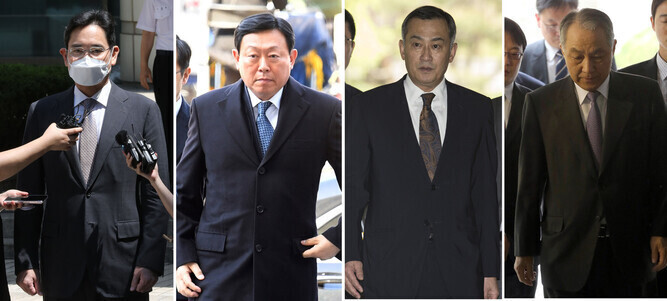hankyoreh
Links to other country sites 다른 나라 사이트 링크
[Editorial] How long will Korea let chaebols be above the law?

On Aug. 12, South Korean President Yoon Suk-yeol administered National Liberation Day special pardons to 1,693 people.
Among them were some chaebol heads, including Samsung Electronics Vice Chairperson Lee Jae-yong and Lotte Group Chairperson Shin Dong-bin. Not included on the list of pardon recipients were former President Lee Myung-bak and former South Gyeongsang Province Gov. Kim Kyoung-soo.
Yoon does appear to have restrained himself from handing out pardons to politicians willy-nilly due to his low approval ratings. But his choices only drew further attention to an uncomfortable truth of Korean society — namely that the chaebols stand above the law.
Since taking office, the Yoon administration has overtly declared its “pro-business leanings,” offering a preview of the pardons that would be forthcoming.
In a government interpellation session with the National Assembly on July 27, Prime Minister Han Duck-soo indicated that he would actively speak with Yoon about pardoning Lee Jae-yong and Shin Dong-bin with Yoon. The Federation of Korean Industries (KFI) and other business groups have also been vocal about demanding pardons for chaebol leaders. Among those chiming in was the head of the Samsung legal compliance oversight committee, which is supposed to be monitoring Samsung’s compliance with its legal obligations.
Fielding questions from reporters on his way into his office Friday, Yoon said the focus of his pardons had been “first and foremost on livelihoods and economic recovery.” As always, the need to overcome an economic crisis was offered as a rationale. This time around, fears of a “semiconductor crisis” have been frequently mentioned.
But there has never been any examination of what effects these sorts of pardons for chaebol leaders actually have for the operation of the companies in question, let alone the national economy.
In the case of Lee Jae-yong, his company has been functioning normally and unimpeded in spite of the five-year restriction on employment that he received after being provisionally released last year.
With other pardon recipients — including Dongkuk Steel Mill Chairperson Chang Sae-joo and former STX Group Chairperson Kang Duk-soo — it’s difficult to see what bearing their pardons would have at all on the current economic situation. If anything, we should be concerned about these kinds of free passes only causing damage in the future, when we consider the economic losses that these leaders’ illegal activities inflict on their companies and shareholders.
It has been suggested the administration was following along with public opinion in a case where opinions are divided on whether to pardon chaebol heads and politicians. But the survey findings showing a high level of popular support for pardoning Lee Jae-yong are hard to disentangle from the narratives that opinion leaders and media have been pushing hard during this economic crisis.
Compare that with a 2017 survey that showed 91% of respondents agreeing that South Korea is a society where “only those without money are convicted.” Can the numbers have really changed that much?
Among those receiving pardons and reinstatements were two key figures convicted of offering and receiving bribes in the 2016 government influence-peddling scandal, for which Yoon himself was part of the prosecution team.
After a hearing the same day on charges of accounting fraud during the Samsung C&T merger process, Lee said he would “work hard for the sake of the national economy.” In response, the Justice Party asked, “What’s the point of a trial if we know he’ll just get released when the time comes?”
The Yoon administration needs to give an answer on whether this sort of thing represents the “fairness” and “justice” it so espouses.
Please direct questions or comments to [english@hani.co.kr]

Editorial・opinion
![[Column] Tariffs on China: Trump was dumb, Biden dumber [Column] Tariffs on China: Trump was dumb, Biden dumber](https://flexible.img.hani.co.kr/flexible/normal/500/300/imgdb/original/2024/0520/191716191153918.jpg) [Column] Tariffs on China: Trump was dumb, Biden dumber
[Column] Tariffs on China: Trump was dumb, Biden dumber![[Column] What if Seoul took reunification by force off the table? [Column] What if Seoul took reunification by force off the table?](https://flexible.img.hani.co.kr/flexible/normal/500/300/imgdb/original/2024/0520/3017161928630494.jpg) [Column] What if Seoul took reunification by force off the table?
[Column] What if Seoul took reunification by force off the table?- [Editorial] Intensifying US-China rivalry means Seoul must address uncertainty with Beijing sooner than later
- [Column] When ‘fairness’ means hate and violence
- [Editorial] Yoon must stop abusing authority to shield himself from investigation
- [Column] US troop withdrawal from Korea could be the Acheson Line all over
- [Column] How to win back readers who’ve turned to YouTube for news
- [Column] Welcome to the president’s pity party
- [Editorial] Korea must respond firmly to Japan’s attempt to usurp Line
- [Editorial] Transfers of prosecutors investigating Korea’s first lady send chilling message
Most viewed articles
- 1Xi, Putin ‘oppose acts of military intimidation’ against N. Korea by US in joint statement
- 2Kim Jong-un wanted to meet with residents of shelled Yeonpyeong Island in South, Moon recalls in mem
- 3For new generation of Chinese artists, discontent is disobedience
- 4Berlin mayor hints at tearing down ‘comfort women’ memorial in city
- 5[Column] What if Seoul took reunification by force off the table?
- 6To weigh costs and benefits, Korea must stop treating US troop presence as a sacred cow
- 7[Column] Tariffs on China: Trump was dumb, Biden dumber
- 8China, Russia put foot down on US moves in Asia, ratchet up solidarity with N. Korea
- 9Putin’s trip to China comes amid 63% increase in bilateral trade under US-led sanctions
- 10[Exclusive] Unearthed memo suggests Gwangju Uprising missing may have been cremated